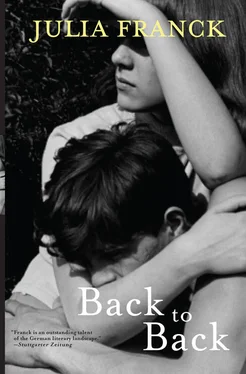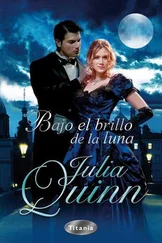No, whispered the man, I don’t have to. He sounded grateful, as if Thomas had let him off lightly. Cautiously, he felt the largest of the swellings on the back of his head. Then he dropped back, and his bib upset the cup with a spout that Thomas had not been holding firmly enough.
Thomas fetched a bucket and cloths, and cleaned the bedside table and the floor. The bed had to be made up again; he needed Marie’s help.
They didn’t have time until an hour later, when they put a clean sheet on the bed, turning and moving the man with the growths on his head. Marie fetched cotton wool and some tincture, and carefully dabbed the man’s eye. Thomas watched. He could have watched her for hours curving her fingers, holding the wad of cotton wool, standing there and smiling, fresh, no courage or grief in her attitude, he admired her.
Please go and check the nappies of the patients in Room 1 and Room 6. Thomas went. It seemed that Marie found nothing difficult.
Her gliding gait meant that she could approach you silently, whatever shoes and height of heels she was wearing. Suddenly she was standing beside Thomas, and her delicately sweet perfume rose to his nostrils.
When we come off the shift this evening, then. . She looked at him with her large, velvety eyes.
Your husband will be waiting for you? he asked, finishing her sentence.
No. She lowered her eyes, and once again she looked as sad as she had at midday. He won’t be waiting at the gate, not today. She seemed to be wondering what to say to him, and how. Maybe I could go home to your place?
To my place? Thomas looked at her in surprise.
To your family. You still live at home, don’t you?
Of course you can, said Thomas, nodding vigorously. Thoughts crowded in on him. What made her express that wish?
I can’t go home today. I’ll explain later. She turned and hurried down the corridor, where a patient could be heard calling out through an open door.
Thomas threw the soiled nappies on the laundry cart. His pulse was racing for the rest of the day; wherever he stood, wherever he sat, he was wondering how he came to have this unhoped-for stroke of luck. He also wondered whether Käthe would be at home, or Ella.
As she had on the first day, Marie reached her hand out to him as they went down the broad path between the flower beds towards the porter’s lodge, in the darkness that had fallen some time ago. He held her hand, and felt the warmth that radiated from her.
Walking in the dark, with the light of a street lamp falling on their faces only now and then, they did not look at one another as they talked.
When I’m on late shift or the night shift, at weekends like these, my little girl stays with my parents. I take her to Bergholz on the Sputnik express shuttle, and I collect her again on Sunday or on Monday morning, depending which shift I’m working.
Thomas said nothing. Perhaps her husband worked shifts as well, so he couldn’t look after the child when she was at work or at weekends like this. Thomas felt her hand in his and was glad that she didn’t withdraw it as they passed the porter.
The tram was standing at the stop with all its lights on. They ran to catch it, hand in hand.
Thomas was still holding her hand as they sat side by side. Her ring shone, pale and narrow. He put his other hand under hers, so that he could clasp it entirely, covering it protectively from above, supporting it from below. He wondered if she would let him stroke it. Won’t your husband be surprised if you don’t go home?
Now she bent her gaze so low that he had the impression she felt ashamed.
What will he be thinking?
He thinks I have to work overtime on the shift. Sometimes the night shift is late. Her lips moved as she began, several times, to say more, and with her lips her nostrils moved almost imperceptibly. Fine crumbs of her make-up quivered there, ready to fall off at any minute.
We don’t have a telephone, she said with an anxious smile. I told the nurse on night duty to tell him, if he calls from the telephone kiosk, that I was kept late, and then I went home to Sabine. Sometimes I sleep at Sabine’s.
Now Thomas did press her hand. She freed it from his, opened the large patterned bag on her lap, and searched it until she produced a powder compact.
Excuse me, she said, turning to the dark panes of the tram windows and powdering her nose, forehead, cheeks and chin. Her skin had a grey tinge, and fine cracks showed everywhere in her make-up. Thomas wanted to tell her that she didn’t need to make herself up, any more than she had to smile. But he said nothing and waited until she had put the compact away and had a hand free that he could take and hold in his again. At Alexanderplatz they got off, went up the steps together and waited for the suburban train going in the direction of Erkner.
All the windows in the house were dark when Thomas, still holding Marie’s hand, had walked through the wood from the suburban railway station, and had then gone along the sandy path to reach the wide road paved with cobblestones.
The front door was locked, a clear sign that Käthe and Ella were not at home this evening. He switched on the light in the corridor and led the way to the smoking room. There was a smell of wax. Käthe had forgotten to turn off the flame under the little hotplate on the tea trolley. A tiny remnant of wax was bubbling in the pot, which was steaming. Thomas turned out the flame and stepped on the switch of the standard lamp. Marie held on to her big bag with both hands. Shyly, she looked around, her eyes wandering over the tall cacti by the window, the small clay models standing on the table ready for firing, the large chunk of stone on the windowsill, the shining bowl on the chest of drawers, varnished green. She marvelled at all the pictures on the walls. That bright yellow furze is by Kesting, Thomas said, pointing over to the charcoal drawings. And that one is by Kollwitz, like the etching beside it.
But Marie did not know those names. She nodded politely and said fancy that three times running, until Thomas mentioned no more names after Kollwitz, because he didn’t want to make her feel awkward. What did it mean to her if a picture was by Schmidt or Beckmann? He did not mention the clay Rosa Luxemburg standing under its damp cloth on the veranda. Enumerating all those names would seem conceited to her.
Would you like some wine or some tea?
She couldn’t decide, and then wanted both.
He offered her the armchair in his room and sat on the bed opposite her. She sat on the very edge of the chair, her slender legs crossed at the knees, swinging her heels in their delicate shoes.
May I use your bathroom? I’d like to have a wash.
Your hands?
No, my face. It’s been itching all day. When the foundation dries I can hardly stand it. Now she laughed awkwardly and got to her feet.
He showed her the bathroom. Before he could explain anything she had closed the door. The bolt stuck. Thomas heard her struggling with it in vain. Since Ella’s accident with the lodger, the bolt was bent so badly that no one could shift it.
Thomas opened the bottle of wine and filled both glasses. In the Johannishof, he had noticed that the glasses were only half filled at first. Only later, as the evening wore on, did they seem to be fuller.
Marie didn’t take long. Her skin was reddened; perhaps rubbing off the make-up or the cold water had irritated it. But Thomas saw something else. It took him a moment to realise what he was looking at. The skin over one of her cheekbones was discoloured blue.
Marie must have noticed him staring at her. She put one hand to her cheek and said: I walked into an open cupboard door this morning.
An open cupboard door? Thomas knew he had better keep his mouth closed if he wasn’t going to embarrass her even more.
Читать дальше












